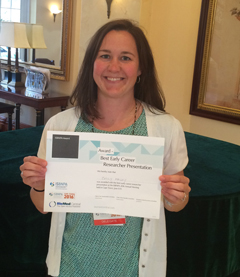August 24, 2016
Kinesiology professor Emily Mailey presents and earns award in Cape Town, South Africa

After traveling halfway across the globe to Cape Town, South Africa, Emily Mailey, assistant professor in the kinesiology department, was awarded Best Early Career Researcher Oral Presentation at the International Society of Behavioral Nutrition and Physical Activity annual meeting June 8-11. Mailey presented her study,"Effects of an intervention to reduce sitting at work on energy, fatigue and mood among sedentary female employees."
The society seeks to better human health through highlighting cutting edge research in the area of physical activity and nutrition behaviors. The 2016 annual conference hosted more than 600 attendees and was specifically located in Africa to better promote the international scope of the society and encourage further international collaborating and sharing.
In spite of the strong competition, Mailey's presentation was selected because of the "high caliber, conceptual quality and methodological rigour evident in her research," according to the judges. Mailey's research intervention was conducted with Sara Rosenkranz, assistant professor in the food, nutrition, dietetics and health department, also in the College of Human Ecology, as part of the duo's interest in sedentary behavior.
The study lasted eight weeks and documented physiological, dietary and psychological outcomes, with Mailey's presentation focusing on the psychological outcomes — or differences in mood. The participants were full-time female employees in sedentary employment roles who partook in one of two protocols: one group took short breaks of 1-2 minutes every half hour to interrupt their sitting time and the second group took two longer breaks of at least 15 minutes per workday.
Mailey and Rosenkranz found that participants in the short break group reduced their sedentary time by about 35 minutes per workday, and reported improvements in energy, mood and fatigue. However, the long break group showed no significant change on these outcomes.
"We're encouraged by these findings because they suggest taking short, frequent breaks from sitting during the workday is a feasible strategy for reducing sedentary behavior at work," Mailey said. "Improvements in outcomes like energy and mood could have an immediate positive impact on both the employee and the overall work environment, which might motivate employers to adopt wellness programs that encourage movement during the workday."
